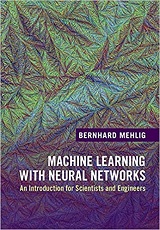
|
FreeComputerBooks.com
Links to Free Computer, Mathematics, Technical Books all over the World
|
|
- Title: Machine Learning with Neural Networks: An Introduction for Scientists and Engineers
- Author(s) Bernhard Mehlig
- Publisher: Cambridge University Press (December 23, 2021); eBook (Creative Commons Licensed)
- License(s): Creative Commons License (CC)
- Hardcover: 260 pages
- eBook: PDF (241 pages)
- Language: English
- ISBN-10: 1108494935
- ISBN-13: 978-1108494939
- Share This:

|
This modern and self-contained book offers a clear and accessible introduction to the important topic of machine learning with neural networks. In addition to describing the mathematical principles of the topic, and its historical evolution, strong connections are drawn with underlying methods from statistical physics and current applications within science and engineering.
Artificial Neural Networks (ANN) are state-of-the-art, trainable algorithms that emulate certain major aspects in the functioning of the human brain. This gives them a unique, self-training ability, the ability to formalize unclassified information and, most importantly, the ability to make forecasts based on the historical information they have at their disposal.
This book provides comprehensive coverage of neural networks, their evolution, their structure, the problems they can solve, and their applications. It describes the use of neural networks in machine learning: deep learning, recurrent networks, and other supervised and unsupervised machine-learning algorithms.
About the Authors- Bernhard Mehlig is a professor of Physics at University of Gothenburg, Sweden.

- Machine Learning with Neural Networks: An Introduction for Scientists and Engineers
- The Mirror Site (1) - PDF
- Exercise Solutions - PDF
-
 Neural Network Learning: Theoretical Foundations
Neural Network Learning: Theoretical Foundations
This book describes recent theoretical advances in the study of artificial neural networks. It explores probabilistic models of supervised learning problems, and addresses the key statistical and computational questions.
-
 Deep Learning with Python, 2nd Edition (Francois Chollet)
Deep Learning with Python, 2nd Edition (Francois Chollet)
This book introduces the field of deep learning using Python and the powerful Keras library. It offers insights for both novice and experienced machine learning practitioners, and builds your understanding through intuitive explanations and practical examples.
-
 Dive into Deep Learning (Aston Zhang, et al.)
Dive into Deep Learning (Aston Zhang, et al.)
This is an open source, interactive book provided in a unique form factor that integrates text, mathematics and code, now supports the TensorFlow, PyTorch, and Apache MXNet programming frameworks, drafted entirely through Jupyter notebooks.
-
 Deep Learning for Coders with Fastai and PyTorch
Deep Learning for Coders with Fastai and PyTorch
This book show you how to train a model on a wide range of tasks using fastai and PyTorch. You'll also dive progressively further into deep learning theory to gain a complete understanding of the algorithms behind the scenes.
-
 Neural Network Design (Martin T. Hagan)
Neural Network Design (Martin T. Hagan)
This book provides a clear and detailed coverage of fundamental neural network architectures and learning rules. It emphasizes a coherent presentation of the principal neural networks, methods for training them and their applications to practical problems.
-
 Applied Artificial Neural Networks (Christian Dawson)
Applied Artificial Neural Networks (Christian Dawson)
This book focuses on the application of neural networks to a diverse range of fields and problems. It collates contributions concerning neural network applications in areas such as engineering, hydrology and medicine.
-
 Foundations of Machine Learning (Mehryar Mohri, et al)
Foundations of Machine Learning (Mehryar Mohri, et al)
This book is a general introduction to machine learning. It covers fundamental modern topics in machine learning while providing the theoretical basis and conceptual tools needed for the discussion and justification of algorithms.
-
 Machine Learning Yearning (Andrew Ng)
Machine Learning Yearning (Andrew Ng)
You will learn how to align on ML strategies in a team setting, as well as how to set up development (dev) sets and test sets. After finishing this book, you will have a deep understanding of how to set technical direction for a machine learning project.
-
 Machine Learning from Scratch (Danny Friedman)
Machine Learning from Scratch (Danny Friedman)
This book covers the building blocks of the most common methods in machine learning. This set of methods is like a toolbox for machine learning engineers. Those entering the field of machine learning should feel comfortable with this toolbox.
-
 Probabilistic Machine Learning: An Introduction (Kevin Murphy)
Probabilistic Machine Learning: An Introduction (Kevin Murphy)
This book is a comprehensive introduction to machine learning that uses probabilistic models and inference as a unifying approach. It is written in an informal, accessible style, complete with pseudo-code for the most important algorithms.





